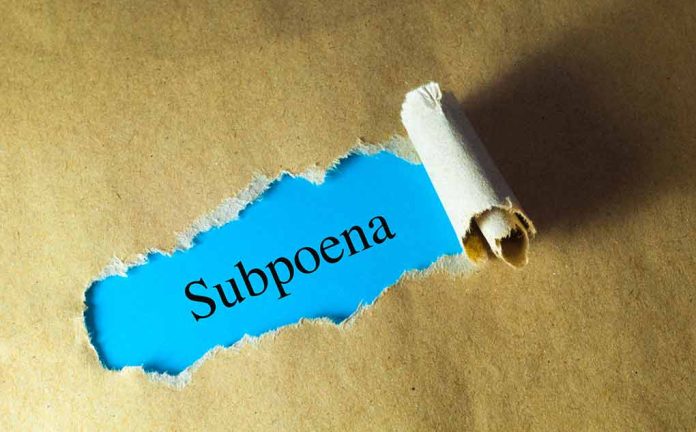
Attorney General Pam Bondi has eliminated Biden-era protections for journalists, allowing prosecutors to once again use subpoenas and search warrants against reporters in leak investigations as the Trump administration intensifies its crackdown on unauthorized disclosures of sensitive government information.
Key Takeaways
- The Justice Department has rescinded a 2022 Biden-era policy that restricted prosecutors from seizing reporters’ records during leak investigations.
- Attorney General Pam Bondi cited recent classified information leaks to news outlets as justification for the policy change.
- The new approach allows prosecutors to compel testimony from journalists and obtain their records with approval from DOJ leadership.
- The policy shift signals President Trump’s administration taking a more aggressive stance toward press freedoms in pursuit of leak investigations.
- Press freedom advocates warn the change could have a chilling effect on reporting that serves the public interest.
DOJ Reverses Press Protections
The Department of Justice under Attorney General Pam Bondi has officially rescinded protections that limited prosecutors from compelling journalists to reveal confidential sources or surrender records in leak investigations. The policy reversal, announced in a recent memo, dismantles safeguards established during the Biden administration that had sought to protect press freedom and prevent unreasonable interference with news gathering activities. The change represents a significant shift in the balance between national security concerns and First Amendment protections for journalists.
The new guidelines permit the use of subpoenas, court orders, and search warrants to obtain information and testimony from journalists, though such actions will require approval from DOJ leadership and must provide advance notice to the affected news organizations. The policy revival marks a return to more aggressive approaches toward the press previously seen during both the Obama and first Trump administrations, which had faced significant criticism from media advocacy groups and constitutional experts.
The Justice Department has rescinded a policy implemented during the Biden administration that restricted prosecutors from seizing reporters' records in criminal investigations, according to an internal memo obtained by ABC News. https://t.co/wVSJfDc6zi
— ABC News (@ABC) April 28, 2025
National Security Concerns Cited
Attorney General Bondi justified the policy change by pointing to specific leak incidents, including recent disclosures of classified information to The New York Times that prompted a criminal investigation. Homeland Security Secretary Kristi Noem and the FBI are also reportedly pursuing charges against officials believed to be leaking details about deportation operations. The administration has framed the policy shift as necessary to identify and punish those who compromise sensitive information and potentially endanger national security.
“Federal government employees intentionally leaking sensitive information to the media undermines the ability of the Department of Justice to uphold the rule of law, protect civil rights, and keep America safe. This conduct is illegal and wrong, and it must stop,” Pam Bondi said.
While emphasizing that American citizens would be indignant if foreign journalists were stealing U.S. secrets, Bondi nonetheless acknowledged the importance of press independence in her directive. However, she notably qualified this recognition by referring to “the lack of independence of certain members of the legacy news media,” a perspective that aligns with President Trump’s frequent criticisms of mainstream news organizations.
Procedural Safeguards Remain
Despite rescinding the broader protections, the Justice Department has directed its Office of Legal Policy to publish new guidelines that will include some procedural protections when obtaining information from journalists. The Attorney General must personally approve efforts to question or arrest members of the news media, and the department aims to ensure that any investigative actions against journalists remain as narrow as possible to minimize interference with legitimate news gathering activities.
“These procedural protections recognize that investigative techniques relating to newsgathering are an extraordinary measure to be deployed as a last resort when essential to a successful investigation or prosecution,” said Pam Bondi.
Press freedom advocates have expressed alarm about the potential consequences of this policy change. Bruce Brown of the Reporters Committee for Freedom of the Press emphasized the crucial role that confidential sources play in enabling important investigative journalism that has historically revealed significant government misconduct or overreach. Without strong protections for reporters and their sources, many fear that vital public interest reporting could be severely hampered.
“Some of the most consequential reporting in U.S. history — from Watergate to warrantless wiretapping after 9/11 — was and continues to be made possible because reporters have been able to protect the identities of confidential sources and uncover and report stories that matter to people across the political spectrum,” Bruce Brown stated.
Historical Context and Future Implications
The Biden-era policy that has now been rescinded was formalized in 2022 following revelations that the Justice Department under the previous Trump administration had secretly seized phone and email records from reporters at The New York Times, The Washington Post, and CNN. Those seizures had occurred without the journalists’ knowledge during investigations into classified information leaks. The 2022 policy had sought to prevent similar actions by limiting the use of compulsory legal processes against journalists.
The policy shift comes at a time when the relationship between the Trump administration and many mainstream news organizations remains tense. Critics of the change fear it could be used selectively against news outlets perceived as unfriendly to the administration, while supporters maintain that protecting classified information is essential for national security regardless of which news organizations might be affected. As the new guidelines are developed and implemented, their practical impact on press freedom and the public’s right to know will become increasingly clear.
Sources:
- Trump DOJ rescinds Biden-era protections for news media
- Justice Department revokes Biden-era protections for reporters in leak investigations : NPR














